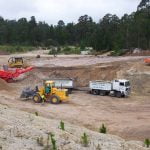A new wave of confidence has animated the air travel sector with erstwhile struggling airlines now acquiring state-of-the-art airplanes to replace leased equipment.
With lending rate as low as 10 per cent on liquidity inflow to the sector, local airlines are now buying aircraft like Embraer 145, Bombardier CRJ900 and even the Boeing 777 wide-body machine. The unit cost of these airplanes ranges between N5.4 billion ($15 million) and N54 billion ($150 million).
Stakeholders have described the development as positive, citing spiral effects on available capacity, new routes, ability to compete on both regional and international routes, better options for the travelling public and more revenue for operators, regulators and the economy at large.
The Guardian learnt that the paradigm shift, alongside growing support from banks, is not unconnected with improved safety records in the industry. The sector has had almost three years of zero-accidents.
Also, the Federal Government’s implementation of zero-duty regime and withdrawal of Value Added Tax (VAT) on commercial aircraft and spare parts are incentives for wider profit margins for operators and investors.
Amid these, passenger traffic and demand prospects remain high. Less than eight per cent of the Nigerian population travels by air, yet 95 per cent of the total market share is dominated by foreign airlines.
Furthermore, airlines expanding their operations into African countries, where banks have interest, is a ready-made opportunity for such banks and airlines to partner. For instance, Air Peace airlines has been busy expanding its regional operations and in the process attracting some banks “that are now even begging us to take their offers,” says the airline’s corporate communications manager, Chris Iwarah.
Air Peace has in the last few months acquired six 50-seat capacity Embraer 145 Jets, with two already in local and regional operations. Each Embraer is valued at about N5.4 billion.
The Chief executive officer of the airline, Allen Onyema, confirmed that bank loan was acquired to purchase Boeing 777 airplanes, of which two (B777-200 and B777-300) are now parked at the Murtala Muhammed International Airport, Lagos.
The new acquisitions, with two more in the offing, target six new routes: London, Johannesburg, Sharjah, Beijing, Dubai and Houston Texas, before the end of the year.
Similarly, after a dismal outing on its London and Dubai routes, Med-View Airlines Plc has partnered First Bank to acquire a Boeing 777 for its hajj and international operations. The plane costs about N54 billion.
The Managing Director of Med-View, Muneer Bankole, said the airline had, over the years, leased aircraft for hajj and international operations at a huge cost to its foreign reserve.
Welcoming the aircraft recently, Bankole said: “The cost is huge when you lease equipment and you don’t get something in return because the money goes out of the economy. With the support of God and First Bank, we made this happen.
“In the wake of challenges, we had to address it with the bank. First Bank gave us a 10 per cent reserve, which empowers us to be able to buy this aircraft. This aeroplane is a lease purchase from our partner in Canada. It takes a bold mind on the part of our partner at a time a lot of people don’t want to come to Africa to invest,” Bankole said.
He added that two more Bombardier CRJ900 airplanes would soon be available to enhance Med-View’s regional operations.
The Nigeria Civil Aviation Authority (NCAA) described the new set of acquisitions as some of the most efficient and effective equipment in the industry. It said the development was in line with the smart business plans it had been encouraging operators to adopt for survival.
The NCAA spokesperson, Sam Adurogboye, described the trend as a good business strategy for airlines to consolidate their hold on the sector.
“The sector is really not as bad as people think. If the sector is not assuring, then good banks will not put their money in it. It does not mean that leasing aircraft is bad, but problems do occur based on the kind of agreements reached. For us, it is a sign of better things to come,” he said.
The Secretary General of the Aviation Safety Round Table Initiative (ASTRI), Group Captain John Ojikutu (rtd), however, said that while nothing was wrong with aircraft leasing, whether dry or wet lease, “something could be wrong with the decisions of those Nigerians in choosing outright buying (of airplanes).”
He expressed concern that a lot of the airlines would still resort to foreign technical and crew support to use the new equipment, in spite of the high number of unemployed technical crew in the country.
“Believe it or not, it is a clever way for capital flight. Imagine an airline with two B777 paid for outright without designated routes! The cost of each of these aircraft is not less than $150 million.
“Even if the routes are certain, a better option would have been wet lease of about six months that would allow Nigerians to be trained, transferred to the aircraft and thereafter converted to dry lease for another six months. If the routes are profitable, the airline can go for outright purchase.
“Only God knows how long these aircraft would be on the ground before they can start flying and, of course, that comes at a cost. The other option the airline has is to lease them out to other airlines that have need of them on their commercial routes,” Ojikutu said.




